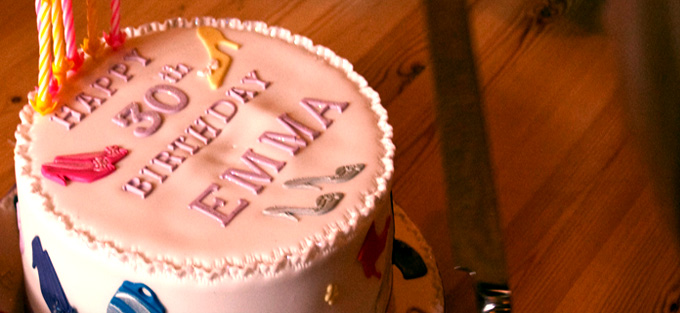by Emma Crossen
I was relieved to turn 30.
In my 20s, I worried that older colleagues would dismiss me as young and naïve or assume that I was just like other 20-somethings, many of whom I found to be immature and naïve.
The 30s seemed to invite fewer assumptions. My 30-something friends weren’t so easy to categorize. Some had been with the same employer since high school; others were just finishing graduate school. Some reveled in life without children; others were pregnant with a third child. Some lived with three roommates in rental apartments; others were building their suburban dream homes. My 30-something friends were also diverse in geography, professions, personalities, not to mention family histories and religious beliefs. And this doesn’t even account for the extreme diversity of the rest of the world’s 30-somethings.
In other words, you shouldn’t make assumptions about a 30-year-old based on her age. And that’s exactly how I liked it.
This is true, but it’s ridiculous to single out 30-somethings for this honor. It applies to anyone at any age. Whether she’s 30, or 82 or 17, age tells you very little about another person.
This was brought home to me when I turned 30.
 In my 20s, I drew conclusions about myself based on age. I measured myself against culturally accepted milestones for 20-somethings. I graduated from college, did a couple of internships, volunteered in India for a year, experienced my first long-term romantic relationship, lived in multiple cities, started accumulating savings, got married, and finished graduate school. The decade had its own momentum, driven largely by education. I found satisfaction in being on schedule or even ahead of the game, as though my experiences were more valuable because I lived them in my twenties.
In my 20s, I drew conclusions about myself based on age. I measured myself against culturally accepted milestones for 20-somethings. I graduated from college, did a couple of internships, volunteered in India for a year, experienced my first long-term romantic relationship, lived in multiple cities, started accumulating savings, got married, and finished graduate school. The decade had its own momentum, driven largely by education. I found satisfaction in being on schedule or even ahead of the game, as though my experiences were more valuable because I lived them in my twenties.
By the time I turned 30, all that was done. The momentum ended. There was no societally sanctioned next step before me. And with every passing day, there were more people younger than I who were accomplishing far more impressive feats than I ever would. There I was with a graduate degree, a spouse, and no big plans for the future.
Yet every day I have a life to live, people to love, needs to meet, ideas to conceive, colleagues to collaborate with, and beliefs to practice. Could it be that my capacity to contribute to the world and receive from it has absolutely nothing to do with my age or how it compares to the age of others?
At 30, I began to recognize that age does not predict my worth or determine my unique perspective and abilities. Age does not make my accomplishments more or less valuable.
The real breakthrough for me is in accepting that the same is true of everyone else.
If I know your age, be it 36 or 85, I can make an educated guess about your cultural reference points, what music you grew up listening to, whether you remember events like the assassination of Martin Luther King, Jr. or the Challenger explosion. But so what? I may know what sitcoms were popular when you were a child, but I don’t know if you had a television at your house, what country you lived in, if you loved watching with your family, or if you used television as an escape from an unhappy family situation. And I haven’t even begun to learn about your personality, your skills, what brings you joy and makes you laugh, what obligations affect your life now, or how you make life better for the people around you.
Age doesn’t reveal any of the good stuff about you or me. Getting to the good stuff takes curiosity, attention, time, and shared experience. It requires me to acknowledge my assumptions and resist the urge to use them.
Now that I’m 33, I’m learning this lesson every day.
What a relief.
Emma Crossen turned 30 while living in Chicago (her favorite city!), just a few hours from her hometown of Terre Haute, Indiana. Recently, she moved to Los Angeles, California, with her husband Andy. Emma is a writer and fundraiser for Courage Campaign. She studied ministry at Harvard Divinity School.


I will soon turn 90 and I can still find ways to serve the Lord. Prayers for our Women’s Brunch on Saturday, diapers for Child Care Kits for LWR, knitting caps for the homeless, every day the Lord shows me He still needs me and I am thankful. Elaine
I knew I was reading about Emma Crossen when I first started reading and saw the picture of the cake. Congratulations on a meaningful article and the wonderful studies in Women of Today. Keep up the good work.
Emma, I love your comments about age… that age does not predict my worth or abilities. That age is just a number and even though my “number” is getting awfully “big”, I am enjoying all of my experiences and hope that I keep growing and learning. Recently we attended my mother-in-law’s 103rd birthday party. That wonderful lady of 103 years has advice. It is “Live and let live….and be nice to others”. But she would also say, “Age is just a number. It’s what you do in life that counts.”